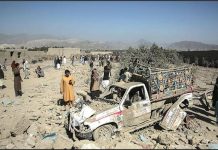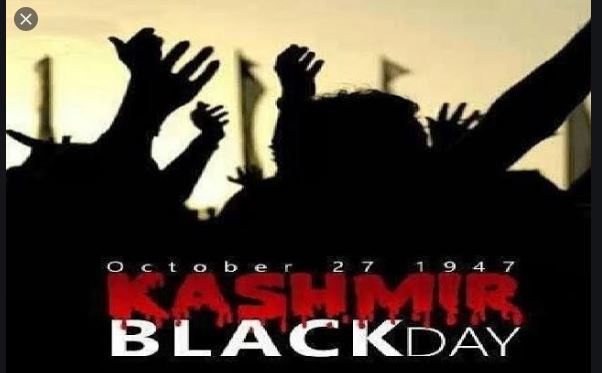
By Brigadier Syed Karar Hussain Abidi (Retired)
Background
When the British subcontinent was divided in 1947 into two sovereign states — Pakistan and India — the principle guiding the partition was clear: Muslim-majority areas would join Pakistan, and Hindu-majority areas would go to India. The princely state of Jammu and Kashmir, with over 85 percent Muslim population, was thus destined to accede to Pakistan. However, India, through deceit and coercion, trampled upon the democratic and moral rights of the Kashmiri people.
October 27, 1947, marks one of the darkest days in South Asian history. On this day, India violated international law and the partition plan by landing its troops in Srinagar and forcibly occupying the territory of Jammu and Kashmir. The Hindu ruler, Maharaja Hari Singh, against the will of his Muslim subjects, signed a dubious and illegal “Instrument of Accession” with India. The people of Kashmir rejected it outright, and even the United Nations later recognized the territory as a disputed region.
Since that fateful day, Kashmir has witnessed relentless oppression, systematic killings, forced disappearances, and mass detentions. Thousands of Kashmiris have been martyred, tens of thousands wounded, and hundreds of women have been dishonored. The use of pellet guns on unarmed youth, arbitrary arrests, and curfews have turned the valley into an open-air prison. Yet, the conscience of the international community remains disturbingly silent.
Every year, therefore, on 27th October, the people of Jammu and Kashmir observe Kashmir Black Day to remind the world that India’s occupation is illegal and that their struggle for freedom continues unabated.
Responsibility of Kashmiri Youth
The youth of Kashmir are the true heirs and torchbearers of the freedom movement. The Indian occupation, instead of crushing their resolve, has strengthened their spirit. The new generation of Kashmiris that has emerged over the past two decades is intellectually mature, politically aware, and deeply committed to the cause of freedom.
They understand that liberty is not granted as a favor but earned through sacrifice, courage, and conviction. Despite brutal crackdowns, imprisonment of leaders, and curbs on media and communication, Kashmiri youth have continued their peaceful resistance. They have used education, technology, and social media as tools to expose Indian atrocities and project their narrative to the world.
Even under complete internet blackouts, Kashmiri students and activists found innovative ways to send images and stories of their struggle to the global community. Their pens, cameras, and voices became mightier than the oppressor’s guns.
The foremost duty of Kashmiri youth is to remain united and disciplined. Sectarianism, political rivalry, and personal egos must never divide them. Their mission is sacred — to achieve self-determination and preserve their identity. They must use every peaceful, intellectual, and diplomatic platform to highlight the Kashmir cause — from universities to human rights forums and from media houses to parliaments.
Islamic teachings emphasize resistance against tyranny and standing up for justice. In this sense, the struggle for Kashmir’s freedom is not merely political but a moral and spiritual obligation. The youth of Kashmir must continue this mission with faith, patience, and unity, ensuring that the flame of freedom never fades.
Pakistan’s Compulsion and Responsibility
For Pakistan, the Kashmir issue is not just a matter of geography or politics — it is an issue of national ideology, faith, and survival. The very foundation of Pakistan rests upon the Two-Nation Theory, and Kashmir is the lifeline of Pakistan. Quaid-e-Azam Muhammad Ali Jinnah declared unequivocally: “Kashmir is the jugular vein of Pakistan. Without it, Pakistan cannot survive.”
Therefore, detachment or indifference to the Kashmiri cause is unthinkable for the Pakistani nation. Pakistan has consistently supported the right of self-determination for the people of Jammu and Kashmir on every international forum. The emotional and ideological bond between the people of Pakistan and Kashmir remains unshakable. Every year, the entire nation observes 27th October as Black Day, hoisting black flags, organizing rallies, and expressing solidarity with their oppressed Kashmiri brethren.
However, Pakistan also faces certain compulsions. Being a responsible nuclear state, it has always preferred peace over aggression and sought a diplomatic and lawful resolution in accordance with the UN resolutions. Despite provocations and cross-border hostilities, Pakistan has exercised restraint and pursued dialogue as the most viable option.
Pakistan’s role today is twofold:
1. Diplomatic Front: To continue mobilizing global opinion and remind the world that Kashmir is not an internal matter of India but an internationally recognized dispute.
2. Public and Media Front: To project the voice of Kashmir through print, electronic, and digital media — and to keep the issue alive in global consciousness.
For Pakistan to effectively champion the Kashmir cause, it must maintain political stability, economic strength, and diplomatic consistency. A prosperous and powerful Pakistan is the greatest support for the Kashmiri people.
Responsibility of the United Nations
The United Nations bears a moral and legal obligation toward the people of Jammu and Kashmir. On 5th January 1949, the UN passed a resolution guaranteeing the Kashmiri people their right to self-determination through a free and impartial plebiscite. Both India and Pakistan were bound by this resolution.
Regrettably, over seven decades later, that commitment remains unfulfilled. India has repeatedly defied these resolutions, fortified its occupation, and used draconian laws to silence dissent. The abrogation of Articles 370 and 35A on 5th August 2019 — which stripped Kashmir of its semi-autonomous status — was an open violation of UN resolutions and international norms.
The UN’s credibility is at stake. If it continues to confine itself to statements of concern and symbolic meetings, its founding principles of justice and equality will lose meaning. It must take tangible steps — send fact-finding missions, demand withdrawal of excessive troops, restore civil liberties, and ensure implementation of the promised plebiscite.
If the UN can act decisively in Ukraine, Sudan, or East Timor, why not in Kashmir? Selective morality erodes global peace. Justice delayed, in Kashmir’s case, has become justice denied.
Responsibility of Veto-Holding Powers
The five permanent members of the UN Security Council — the United States, Russia, China, the United Kingdom, and France — hold the key to world peace through their veto powers. Yet, their response to the Kashmir conflict exposes the hypocrisy of global politics.
The Western powers, particularly the U.S. and its allies, often champion human rights, but when it comes to Kashmir, they choose silence due to their strategic and economic interests with India. Russia, while historically aligned with India, must also recognize that the unresolved Kashmir issue threatens regional stability and could ignite a nuclear confrontation.
China has remained the most consistent supporter of Pakistan’s stance, repeatedly urging that the dispute be resolved in accordance with UN resolutions. However, without collective action from all major powers, peace in South Asia will remain elusive.
The veto powers must realize that the Kashmir conflict is not a localized territorial dispute but a humanitarian crisis affecting millions. The region’s instability carries the potential to escalate into a global catastrophe, given that both India and Pakistan are nuclear-armed nations.
If the international community can unite for the cause of Ukraine or Palestine, then moral integrity demands the same commitment to Kashmir. The double standards of global powers have only emboldened the oppressor and prolonged the suffering of the oppressed.
The time has come for these nations to rise above political convenience and uphold the very principles of justice and human dignity on which the UN was founded.
Conclusion
The 27th of October is not just a day of remembrance; it is a day of awakening — a reminder to the world that an entire nation remains subjugated under an illegal occupation. It is a day that exposes the failure of global justice and the selective conscience of international institutions.
Yet, amid darkness, hope endures. The people of Kashmir, despite decades of persecution, have not surrendered their dream of freedom. Their resilience is an inspiration to oppressed nations everywhere. Pakistan continues to stand beside them — morally, diplomatically, and politically — and will never abandon this sacred cause.
The United Nations and global powers must act now, not merely to prevent another war, but to honor the fundamental human right of a people to decide their own destiny.
The day will come when the valleys of Kashmir echo with the call of Azadi (freedom), when the black flags of mourning are replaced with the green flags of victory, and when 27th October will no longer be a Black Day, but a Day of Freedom and Triumph for the brave people of Jammu and Kashmir.

























